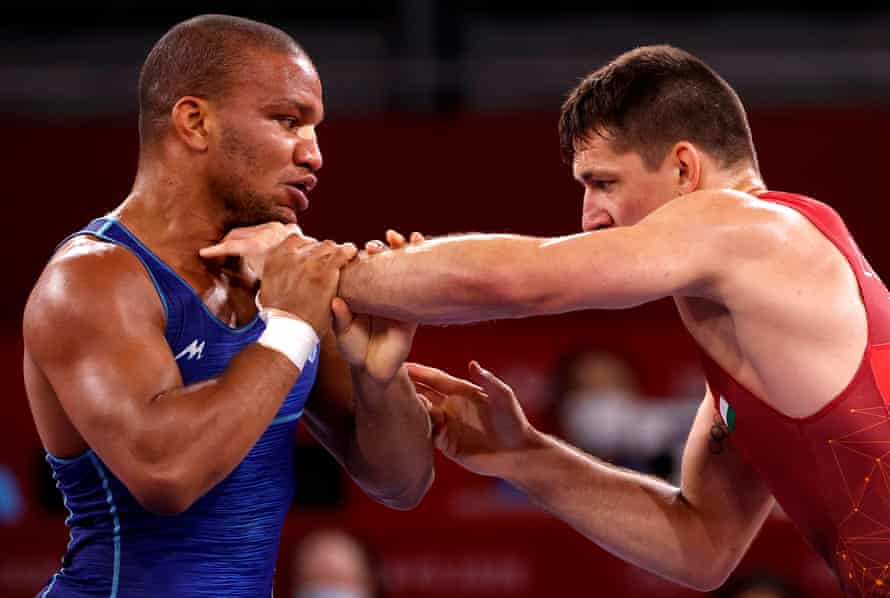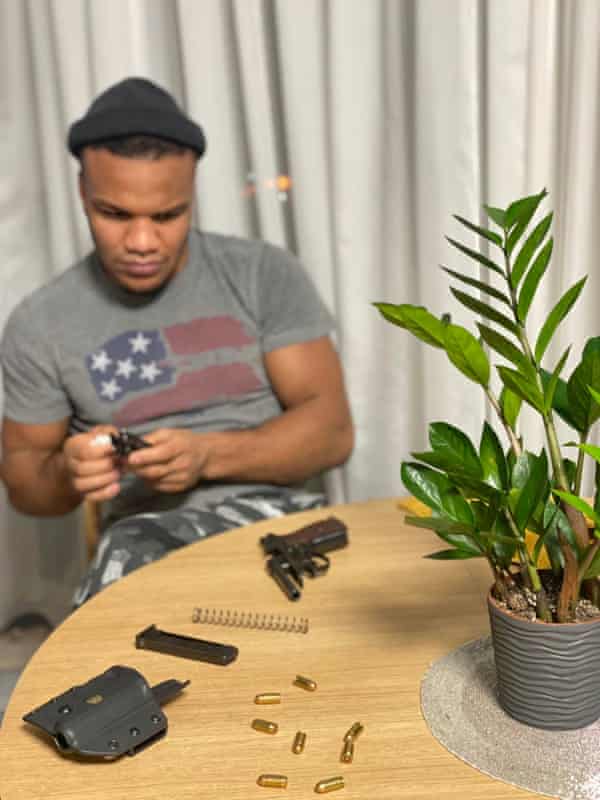
“Usually when you lose a fight, there’s another day,” whispers Zhan Beleniuk, Ukraine’s sole gold medallist at the Tokyo 2020 Games and its first black member of parliament, as he awaits the Russian offensive on Kyiv. “But here you can die at any moment. And it’s not just your own life. It’s the lives of your family. It’s the future of your country. These are the highest stakes ever.”
Seven months ago, the 31-year-old celebrated his Olympic victory in the 87kg Greco-Roman wrestling by performing a traditional Hopak dance and announcing to the world that his all dreams had come true. Now, he tells the Guardian, he feels stuck “in a nightmare that is impossible to believe”.
“It’s really hard to describe the level of terror in Ukraine,” Beleniuk says. “You probably have to be here to understand the extent of it. There are so many stories. So many tragedies.”
On Beleniuk’s desk there are three pistols, and a grenade for good measure. The best weapons, he points out, are needed on the front. But if a Russian hit squad comes for him – he and other MPs are said to be on a kill list – he will be as ready as he can be. “I don’t have any military experience but I have to be prepared,” he says.
For now, though, he spends his time helping to fix problems in his area along with liaising with soldiers and volunteers. But, he admits, it is impossible to ignore the catastrophe going on in cities like Mariupol, where tens of thousands of people are confined to freezing basements with no power, basic sanitation and little food or water, as their city is turned to rubble.
How, he asks, can Europe watch this happen in 2022? “One of the biggest problems we face is that Russian troops are blocking humanitarian corridors in many places so people are without food, without water, and they are actually dying of hunger and dehydration,” he says, choking up. “A few days ago there was even a case of a child who died of dehydration.”
Tragedy has struck closer to home, too. “My ex-classmate was killed because he was putting his pregnant wife into a shelter, and then he went back to take more stuff to bring back,” he says. “And he was basically blown up, along with three other young guys. It is chilling.”
At least, he says, he has managed to get his mum out of Kyiv. “It was quite difficult to have her around because she loves me so much, and her love can be a little bit disruptive because she is worried so much about me,” he says, in a rare moment of levity. “So it was for my own peace of mind to bring her somewhere safer. And also to give me some space to do the work that I’m supposed to do.”
It seems scarcely believable that until a fortnight ago Ukraine was a vibrant European country. Few people seemed to encapsulate the hope for a better future as much as Beleniuk, who was born in 1991, the year the country declared independence from the Soviet Union.
Three years later his Rwandan father died in the country’s civil war, leaving him to be raised by his Ukrainian mother in a one-room flat in Kyiv. Yet despite his tough upbringing, Beleniuk thrived. Having established himself as a hugely successful sportsman he was then elected as an MP in president Volodymyr Zelenskiy’s fledgling Servant of the People party in 2019.
For Beleniuk, being a servant of the people means staying in Kyiv – whatever the consequences. “We’ve heard that the Russians have targeted the president and certain members of parliament, because they want to bring in a puppet who will follow their orders,” he says. “But I am from Kyiv. I am not going anywhere, and nor is the president.”

Wrestlers sometimes have a reputation for being more brawn than brain. Beleniuk, however, is more like a warrior-poet. When asked whether sport is in any way a metaphor for war he is blunt. “You can’t draw any parallels,” he says. “With sport there is no fear of an unexpected death, or your family dying at any time.
“And, funnily enough, I have some friends who are serious athletes, and we did martial arts or wrestling together, and they have left for the safest part of the country. And there are others who have never shown any signs of aggression, who are at the front and ready to do everything needed.
“You never know exactly how people will respond to a war until it happens.”
While he waits for the oncoming storm, Beleniuk is determined to use his popularity across eastern Europe to influence hearts and minds in Russia. “It’s very challenging because it really feels like Russian society is brainwashed,” he admits. “No matter how much proof they see, they interpret it in their own way. They talk about the Ukrainians killing people themselves or destroying infrastructure just to spite the Russians. And it’s so difficult to convince them otherwise.”
That frustration also extends to the lack of elite Russian athletes speaking out against the invasion. “I see two general responses,” he says. “The first is silence. The second is the support of the killers and murderers of the attacks, of Putin’s politics, of this devastation of our cities in Ukraine. That has been really disappointing because that comes from elite athletes, world champions and Olympians.”
Some of the Russian propaganda has also focused on Ukraine being a neo-Nazi state and being racist – something that Beleniuk insists is pure lies.
It is not that Beleniuk has not experienced racism. After he returned from Tokyo a gang of youths confronted him. However he insists that such incidents are the exception, not the rule.

“The Russian propaganda is trying to say that people in Ukraine are racist, and that black people are harassed and abused in the country,” he says. “But I have to tell you – and I think I have the right to do that – it’s not true. I’m a really good example of that. I’m a member of parliament and it was made possible for me to make all my dreams come true.”
As our interview draws to a close, Beleniuk praises the International Olympic Committee for applying sporting sanctions and says businesses withdrawing from Russia have helped. But he insists that the west needs to do more to save Ukraine from even greater destruction and death.
The answer, he insists, is to enforce a no-fly zone over Ukraine to stop Russia bombing cities from the air. Otherwise he says that thousands more innocent civilians and children will die.
“Unfortunately, it hasn’t been done because everybody’s afraid of a third world war,” he says. “Putin is a terrorist who is trying to intimidate the rest of the world with nuclear weapons. And we understand that. But Ukraine is the last post protecting Europe, protecting democracy and protecting the democratic independence of the European states.
“And if Putin is not stopped now, what’s going to happen next? What if he wants the Baltic states, and he says that historically they belong to the Soviet Union and to the Russian Empire? What then?”
For the moment, Beleniuk watches, waits and steels himself for the fight to come. “When I was preparing for the Olympics, I thought it was the hardest time of my life because I had to combine working in parliament with training for Tokyo,” he says, laughing at his naivety. “But these days are a far more serious trial in terms of importance and responsibility.
“However, we’re 100% ready. And everything is being done to prepare the city for a possible attack so that it can survive. Because it’s our city – and our country.”
